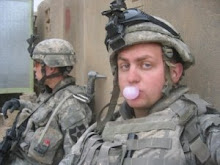How often do soldiers want to receive letters? (especially if you have rare access to internet/phone.)
The answer is simple: all the time, especially if contact by phone and internet is limited. Forget mp3 players, DVDs and X Box 360s- letters from home, and especially from a woman, provide the ultimate comfort and peace of mind to a soldier in a war zone. No matter how long a deployment feels, they're ultimately finite. The link back home must remain strong to keep a soldier's head level, and writing letters to them is instrumental. When a young lady named Lauren was writing to me, I treasured every letter sent, reading them over and over. They came with me everywhere. As long as there has been war, there have been letters sent from home to the men fighting as a delicate reminder of what was left behind.
Ideally, what do you want to hear from your friends?
This is a tough one. All my loser friends from home couldn't be relied upon to send an occasional e-mail while I was deployed. My only friends were to the left and right of me in Iraq. But if you're a better friend than what I had, let them know what you have planned for their return. If it's a party, a get-together with other friends, a getaway to a favorite spot, whatever. It provides something to look forward to, a familar setting for a place that will seem a world of difference when the soldier returns. A year, fifteen months, however long the deployment is - a lot has changed in society. Familiarity is key to reintegration. When I left, the coolest thing cell phones did was flip open. When I came back, phones had keyboards. It was incredible, strange and confusing all at the same time.
Be sure to keep them up to date with news. Toward the end of my deployment, we spent anywhere from 3-10 days in the urban wilderness of Baqubah. When we came back to the base, sweaty, filthy and exhausted, the only news we caught was at the dining facility, which was permanently set on Fox News. I could only rely on Bill O'Reilly and Fox & Friends for news, which is like relying on a prostitute to give you safe-sex tips. Let them know what's going on in the world using whatever means you like - phone, emails or letters.
What do you NOT want to hear from your friends?
Don't ask obtuse questions like "how hot is it?" and "did you kill anybody?" It's offensive and flippant. Let them know how things are going in your life, but don't approach it as something they're "missing." They know. Don't press the issue.
What can a friend do to bring her soldier out of his darkness, besides consistent messages of support and willingness to listen or just sit with him?
Let them decide when to open up. It's not something to coerce out of him. He knows you'll listen intently with empathy and support. That's not the issue. The issue is him being comfortable enough with what he has seen and done to talk about it openly. It takes time, and unfortunately everyone is different regarding this issue. War does not leave anyone untouched, physically or mentally. Something about him will change. Your best bet is to recognize that and do your best to understand why the change happened. It could take six months or six years for him to come out of his shell. Be patient.
From another inquirer:
Is him wanting to be alone to decompress and adjust normal for someone coming home from war, even when you have loved ones who want to be with you?
This is a position of extremes. A soldier will either want to be surrounded by loved ones immediately, or he'll want to be alone to sort out his feelings. Everyone is different, so there's no real solution to this if he wants to do something contrary to your wishes. He knows what's best for him to do, so go along with it. Just be sure he doesn't get on that slippery slope of alcohol abuse. It happens like clockwork to returning units, and the first line of defense is other soldiers and loved ones. Keep an eye on him but don't be intrusive.
Hopefully this provides at least a shred of insight for those looking for answers during trying times. If you want answers to your own questions, either leave a comment or email me at hortonhearsit at hotmail dot com.
Also, this is my 100th post. Thanks for keeping up with me dear readers. It has been rewarding beyond belief to stick around this long.
AH
From another inquirer:
Is him wanting to be alone to decompress and adjust normal for someone coming home from war, even when you have loved ones who want to be with you?
This is a position of extremes. A soldier will either want to be surrounded by loved ones immediately, or he'll want to be alone to sort out his feelings. Everyone is different, so there's no real solution to this if he wants to do something contrary to your wishes. He knows what's best for him to do, so go along with it. Just be sure he doesn't get on that slippery slope of alcohol abuse. It happens like clockwork to returning units, and the first line of defense is other soldiers and loved ones. Keep an eye on him but don't be intrusive.
Hopefully this provides at least a shred of insight for those looking for answers during trying times. If you want answers to your own questions, either leave a comment or email me at hortonhearsit at hotmail dot com.
Also, this is my 100th post. Thanks for keeping up with me dear readers. It has been rewarding beyond belief to stick around this long.
AH







12 comments:
Great info. You did a good job pointing out that everyone is different. There aren't text book answers for these kind of situations.
Oh yeah, hopefully there will be 100 more posts. Keep ya' head up, man.
Here's a letter that was often sent home prior to "DEROS""
SOUTH VIETNAM
Dear Family, Friends, Civilians, and Draft Dodgers,
In the very near future the undersigned will once more be in your midst, dehydrated and demoralized, to take his place again as a human being, to enjoy the well-known forms of freedom and justice for all, and to engage in life, liberty, and the somewhat delayed pursuit of happiness. In making your joyous preparations to welcome him back into organized society, you might take certain steps to make allowances for the crude environment which has been his miserable lot for the past twelve months. In other words, he might be a little Asiatic from Vietnamesitis and overseasitis and should be handled with care. Do not be alarmed if he is infected with all forms of rare tropical diseases. A little time in the "Land of the Big PX" will cure this malady.
Therefore, show no alarm if he insists on carrying a weapon to the dinner table, looks around for his steel pot when offered a chair, or wakes you up in the middle of the night for guard duty. Keep cool when he pours gravy on his dessert or mixes peaches with his Seagram's VO. Pretend not to notice if he eats with his fingers instead of silverware and prefers C-rations to steak. Take it with a smile when he insists on digging up the garden to fill sandbags for the bunker he is building. Be tolerant when he takes his blanket off the bed and leaves the sheet and puts it on the floor to sleep on.
Abstain from saying anything about powdered eggs, dehydrated potatoes, fried rice, fresh milk, or ice cream. Do not be alarmed if he should jump up from the dinner table and rush to the garbage can to wash his dish with a toilet brush. After all, this has been his standard. Also, if it should start to rain, pay no attention to him if he pulls off his clothes, grabs a towel and a bar of soap, and runs outdoors for a shower.
When in his daily conversation he utters such things as "Xin loi" and "Choi oi", just be patient. Simply leave quickly and calmly if by some chance he utters "Di di" with an irritated look on his face, because it means no less than "Get the h___ out of here!" Do not let it shake you if he picks up the phone and yells, "Reliable, sir," or says, "Roger out," for good-by, or simply shouts, "Working!"
Never ask why the Jones's son held a higher rank than he did and by no means mention the term "extend". Pretend not to notice if at a restaurant he calls the waitress "numbah one girl" and uses his hat for an ashtray. He will probably keep listening for "Homeward Bound" to sound off over AFVN; if he does, comfort him, for he is still reminiscing. Be watchful when he is in the presence of a woman--especially a beautiful one.
Above all, keep in mind that beneath that tanned and rugged exterior there is a heart of gold-the only thing of value he has left. Treat him with kindness, tolerance, and to an occasional fifth of good liquor and you will be able to rehabilitate that which once was and now is the hollow shell of the happy-go-lucky guy you once knew and loved.
Last, but by no means least, send no more mail to the APO, fill the refrigerator with beer, get the civvies out of mothballs, fill the car with gas, and get the women and children off the streets………………………………………………….. THE KID IS COMING HOME
Glad you're continuing to write, as we love to stop by here and read what you have to say. We hope you'll continue blogging here for a long time to come. ; )
Stay safe. Come home soon.
Peter
http://www.randomously.com
Excellent post...I thought you hit the nail on the head.
Everything translates well into what I experience out to sea.
You're a good egg, Alex.
The Thunder Run has linked to this post in the blog post From the Front: 10/21/2008 News and Personal dispatches from the front and the home front.
wow, thank you so much for this! i have really enjoyed reading it.
thank you...!
This is a very informational post and I appreciate it. I write to deployed soldiers through Angels n' Camouflage and appreciate the pointers.
Blessings,
Mary
This is a great post and I would like to add, if a may, that loved ones should remember that there is a difference between being understanding of some of the bad habits returning soldiers may have, and accepting them as the norm. Tell your soldier how he or she is different...and this can be done without nagging. My fiance did not hesitate to point out my sharp temper, my lack of patience, and my eagerness to drink. Had she hesitated, I might not have leveled out.
Talk about the changes that you both may have undergone, and NEVER accept violent behavior. If you work through it together, it gets fixed a lot sooner.
Thanks again, Dude. Glad you're home and back in school.
Post a Comment